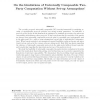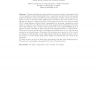24 search results - page 1 / 5 » Information-Theoretic Conditions for Two-Party Secure Functi... |
EUROCRYPT
2006
Springer
13 years 8 months ago
2006
Springer
The standard security definition of unconditional secure function evaluation, which is based on the ideal/real model paradigm, has the disadvantage of being overly complicated to w...
ASIACRYPT
2004
Springer
13 years 10 months ago
2004
Springer
Abstract. We present new results in the framework of secure multiparty computation based on homomorphic threshold cryptosystems. We introduce the conditional gate as a special type...
ASIACRYPT
2005
Springer
13 years 10 months ago
2005
Springer
We propose Gate Evaluation Secret Sharing (GESS) – a new kind of secret sharing, designed for use in secure function evaluation (SFE) with minimal interaction. The resulting simp...
EUROCRYPT
2003
Springer
13 years 10 months ago
2003
Springer
The recently proposed universally composable (UC) security framework for analyzing security of cryptographic protocols provides very strong security guarantees. In particular, a p...
TCC
2009
Springer
14 years 5 months ago
2009
Springer
The first and still most popular solution for secure two-party computation relies on Yao's garbled circuits. Unfortunately, Yao's construction provide security only again...


